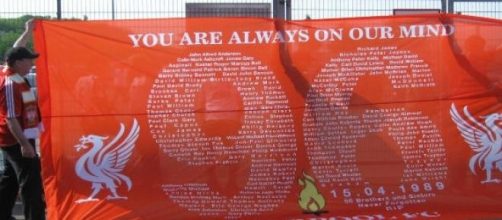As we near the 26th anniversary of the Hillsborough disaster, the most tragic moment in the history of English football, it would appear that those who died and their families will soon receive justice. On 15 April 1989, prior to the replay of the FA Cup semi-final between Liverpool and Nottingham Forrest at Sheffield Wednesday’s stadium, 96 Liverpool fans died and hundreds more were injured. Events began to unfold as Liverpool fans arrived at the stadium and began making their way through the decrepit turnstiles at the Leppings Lane end of the ground.
Once inside the stadium, the majority made their way for the two central ‘pens’ located in the terraced lower stand. They were labelled as pens due to the fencing that was put during the 1970s and 1980s in order to control crowds and avoid acts of hooliganism. As the game neared kick-off, the pens had reached capacity, but huge numbers of fans were still gathered outside the ground trying to gain access. As the pressure mounted on police, Chief Superintendent David Duckenfield gave the order to open the gates allowing the thousands of fans to enter the ground, they made their way for the pens directly, which resulted in those at the front being crushed by the fencing.
Change for football in the face of an ugly lie
The tragedy led to an inquiry by Lord Justice Taylor who published his final report in January 1990.
The document quite clearly stated that the main reason for the disaster at Hillsborough was a failure of police crowd control. Furthermore, it recommended a change in the structure of stadiums around the country. These changes led to the modern stadiums seen on television around the world in the Premier League and a safe controlled environment where families can enjoy a match. Lord Taylor also stated that police commander Ch Supt David Duckenfield “failed to take effective control” and criticised the testimony of the South Yorkshire Police who placed the blame with the Liverpool supporters for arriving at the ground ‘late and drunk’.
Despite the report, all further inquests and court cases resulted in verdicts of accidental death, while Ch Supt Duckenfield had the case against him dropped and retired on medical grounds in 1991.
To think that all the sporting and structural aspects of the Taylor Report were taken on board and used to transform English football into what we all see today, while the criticisms of the police force were so quietly dismissed is unthinkable, and yet that’s exactly what happened.
The truth has taken 26 years, but it’s finally here
In 2012, Prime Minister David Cameron gave a statement based on previously unseen documents relating to the Hillsborough disaster in which he formally apologised for the handling of the situation. This led the High Court to quash the original inquest verdicts and call for a fresh police inquiry into the Hillsborough disaster. Wednesday saw Ch Supt David Duckenfield stand in court and apologise for the mistakes made during the events of April 15th 1989.
It marked an historic moment with the majority of the families of the victims present in the courtroom as Duckenfield, now 70, said: “everybody knew the truth, the fans and police knew that we’d opened the gates.” Furthermore, he acknowledged that he had been living with a terrible lie, something he would regret for the rest of his life.
Duckenfield not only came forward with regards to the lie he and the South Yorkshire police told, he also admitted to not being the best man for the job. Despite being in charge of what, at the time, was one of the biggest sporting events in the British calendar, an FA Cup semi-final, he had little experience in dealing with such crowds. In fact, Duckenfield only had one season’s worth of experience at Hillsborough, he stated he was unaware of the crowd capacities at the ground, failed to recognise the potential for overcrowding in the pens and most importantly, did not know about the “Freeman Tactic” of closing the tunnel that led to the Leppings Lane terraces with a cordon of policeman.
While these admissions will never bring back those who lost their lives that day, it is a relief for the families of the 96 victims. Liverpool football club and the families have spent 26 years campaigning for justice and the truth about Hillsborough. As if losing their loved ones was not punishment enough, they were then made to fight to find out what really happened and see somebody finally take some responsibility for the events. Hillsborough was one of the greatest tragedies of peacetime Britain, but it became a much greater ordeal then it should ever have been and the UK, its government and its police force, must ensure that an injustice of such magnitude never takes place again.

